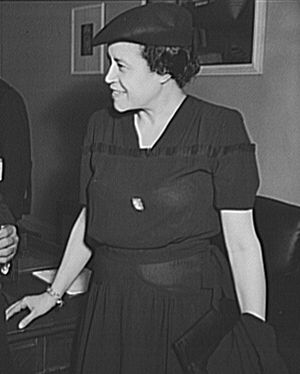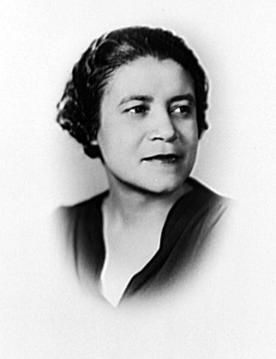Crystal Bird Fauset facts for kids
Quick facts for kids
Crystal Bird Fauset
|
|
|---|---|
 |
|
| Member of the Pennsylvania House of Representatives from the 18th district |
|
| In office 1939 – January 8, 1940 |
|
| Personal details | |
| Born |
Crystal Dreda Bird
June 27, 1893 Princess Anne, Maryland, U.S. |
| Died | March 27, 1965 (aged 71) Philadelphia, Pennsylvania, U.S. |
| Resting place | Mt. Lawn Cemetery, Sharon Hill, Pennsylvania, U.S. |
| Political party | Democratic |
| Spouse | Arthur Fauset (m. 1931; divorced 1944) |
| Occupation | Politician |
Crystal Dreda Bird Fauset (born June 27, 1893 – died March 27, 1965) was an important American leader. She worked hard for civil rights, helped people as a social worker, and was an expert in improving relationships between different racial groups. She made history as the first African American woman ever elected to a state legislature in the United States. She represented the city of Philadelphia, Pennsylvania.
Born in Maryland and growing up in Boston, Crystal Fauset started her career teaching in public schools. She then worked for groups like the Young Women's Christian Association (YWCA) and the American Friends Service Committee. In 1935, she became an assistant director for a big government program in Philadelphia called the Works Progress Administration. She also started helping to organize political campaigns for the Democratic Party.
In 1938, Crystal Fauset was elected to the Pennsylvania state legislature. She served for one year, introducing important bills and changes to laws. These ideas covered topics like making housing affordable and ensuring fair chances for everyone to get jobs. During President Franklin D. Roosevelt's time, she was appointed to the Office of Civilian Defense in 1941. There, she advised on race relations during World War II. Later in her life, she focused on global issues, even helping to start the United Nations Council of Philadelphia.
Contents
Crystal Fauset's Early Life and Education
Crystal Bird Fauset was born on June 27, 1893, in Princess Anne, Maryland. Her parents were Benjamin Oliver Bird and Portia E. Bird. She was one of nine children. Her father was the first principal of Princess Anne Academy, a school for Black students. This academy later became the University of Maryland Eastern Shore. After her father passed away in 1897, her mother became the principal until her own death in 1900.
Crystal was then raised by her aunt, Lucy Groves, in Boston. Her aunt encouraged her to become a teacher. Crystal went to public schools that included students of all races. In 1914, she graduated from Boston Normal School. She continued her education and earned a degree in education from Teachers College, Columbia University, in 1931. That same year, she married Arthur Fauset, who was also an educator and civil rights activist. They later divorced in 1944.
Crystal Fauset's Career and Public Service
Early Work and Community Involvement
After finishing school in Boston, Crystal Fauset taught in public schools from 1914 to 1918. Then, she became a field secretary for the Young Women's Christian Association (YWCA). In this role, she created programs for Black youth and working girls across the United States. She also began speaking out about the needs of the Black community and how to improve race relations. She joined several groups dedicated to helping African Americans gain more rights.
Promoting Understanding with the AFSC
While studying at Columbia University, Crystal Fauset joined the American Friends Service Committee (AFSC) in 1927. This Quaker organization wanted to improve race relations in the U.S. The AFSC hired Crystal to travel and speak about understanding between different cultures. Between 1927 and 1928, she gave about 200 speeches to thousands of people in schools, churches, and community groups. Her goal was to help people understand the shared humanity of Black individuals and to remove misunderstandings that divided people. She talked about the unfairness of racial prejudice and highlighted the important contributions of Black communities throughout history. Most of her speeches were to white audiences in cities like Philadelphia, New York City, and Boston. Her talks in Philadelphia especially made a big impression on the public.
Working for Change (1928–1937)
After her time with the AFSC, Crystal Fauset earned her degree from Teachers College, Columbia University, in 1931. She then helped create the Institute of Race Relations at Swarthmore College in 1933. For two years, she helped lead summer workshops there. This institute studied how Black Americans faced unfairness in jobs and housing. Crystal Fauset was very interested in improving housing conditions and creating affordable homes for Black communities in Philadelphia. She pointed out the need to fix poor city areas. She and other Black women leaders also pushed for more racial integration in activities of the Philadelphia branch of the Women's International League for Peace and Freedom. Crystal Fauset believed that peace and reducing military spending would help Black Americans and the country, especially during the Great Depression.
In 1935, Crystal Fauset became an assistant director for Philadelphia's Works Progress Administration (WPA). The WPA was a government program that built roads and supported artists and writers. While at the WPA, she stopped a system that limited sewing jobs for Black women, which helped more Black women find work. She also started organizing for the Philadelphia Democratic Women's League and the Democratic National Committee (DNC), becoming the director of activities for Black women in the DNC in 1936.
At the 1936 Democratic National Convention in Philadelphia, Crystal Fauset organized Black women WPA workers into a group called the Willing Works Democratic Organization (WWDO). This group had a thousand members and helped more people, especially Black communities, register and vote for the Democratic Party in Philadelphia. Through her work, Crystal Fauset became friends with First Lady Eleanor Roosevelt. They worked together on political issues. Because Eleanor Roosevelt met with Black leaders and President Franklin D. Roosevelt's programs helped Black communities, many Black voters switched from the Republican Party to the Democratic Party by 1936.
Making History in the State Legislature
With support from the Democrats, Crystal Fauset ran for the state legislature in 1938. She made history by becoming the first African American woman elected to a state legislature in the United States. She won her seat in the Pennsylvania House of Representatives for the 18th District of Philadelphia. This area was mostly white at the time. She won by 7,000 votes, gaining strong support from women through her telephone campaign. She was one of the first politicians to use phone calls in her campaign. Crystal Fauset promised her voters, "I will work for laws that help everyone, no matter their race." After her victory, she said, "My interest is not just for my race, but for everyone."
During her time as a state legislator, she represented an area where 66% of the people were white. Crystal Fauset introduced nine bills and three amendments. These ideas supported affordable housing, public health, public aid, and fair employment laws to stop racial discrimination. She also supported a change to the Pennsylvania Female Labor Law of 1913 to improve women's rights at work.
In 1939, Crystal Fauset received her first Meritorious Service Medal from Pennsylvania for her community work. She was also asked to be the main speaker at the annual meeting of the National Council of Negro Women. This group was founded by civil rights activist Mary McLeod Bethune to encourage Black women to get involved in politics.
In January 1940, she left the state legislature. She took a new job as assistant director of education and recreation for the WPA, and also as their race relations advisor in Pennsylvania.
Helping During World War II
In October 1941, Crystal Fauset was appointed to the new Race Relations Division of the Office of Civilian Defense (OCD). This was one of the government agencies during World War II under the Roosevelt administration. The OCD helped organize volunteer defense activities for Americans at home. By summer 1942, about 10 million volunteers participated in things like air-raid drills and planting Victory Gardens. Crystal Fauset was hired to focus on African American efforts because the OCD had been criticized for not including enough people of color. She worked to recruit African American civilians for the war effort. She urged communities to let Black members join local civil defense planning. She also addressed complaints about racial discrimination faced by Black servicemen, such as being excluded from certain places and combat missions. She spoke out against segregation in the U.S. military. She also advised First Lady Eleanor Roosevelt and the head of the OCD on race relations.
Some historians consider Crystal Fauset to have been part of President Roosevelt's "Black Cabinet." This informal group of African American advisors worked to promote civil rights. Even though she had been with the Democratic Party for ten years, Crystal Fauset decided to leave it. She felt the Party was not doing enough to support African American voters and civil rights. She also became unhappy with the Roosevelt administration's slow progress on civil rights. In 1944, she joined the Republican National Committee's division on Negro Affairs and publicly supported Thomas E. Dewey, the Republican presidential candidate. Her decision received mixed reactions from Black newspapers. President Roosevelt won the election that year.
Focusing on Global Issues
After World War II, Crystal Fauset continued her work, turning her attention to worldwide issues. In 1945, she helped start the United Nations Council in Philadelphia. This group later became known as the World Affairs Council. She remained an officer until 1950 and continued to volunteer for years. Crystal Fauset also attended the founding of the United Nations in San Francisco in 1950.
During the 1950s, she traveled a lot to Africa, India, and the Middle East. She became friends with important leaders who fought for their countries' independence, like Kwame Nkrumah of Ghana and Nnamdi Azikiwe of Nigeria. She also knew Ralph Bunche, an African American diplomat who won the Nobel Peace Prize in 1950. Starting in 1955, Crystal Fauset worked to open an "Africa House" in New York. This was meant to be a place for Black and white Americans to learn about Africa by meeting people from the continent.
Crystal Fauset's Later Years and Legacy
In 1955, Crystal Fauset received a second Meritorious Service Medal from Pennsylvania. In her later years, she lived in New York City. She passed away peacefully in her sleep while visiting Philadelphia on March 27, 1965.
Some of Crystal Fauset's important papers and photos are kept in an archive at Howard University. Her significant achievements for African American people were honored with a Pennsylvania Historical and Museum Commission Marker. This marker was revealed in 1991 and can be found outside her old home at 5402 Vine Street in Philadelphia. The memorial states: "The first Black woman elected to a state legislature in the U.S., Fauset, who lived here, won her seat in the Pennsylvania House of Representatives, 1938. She later served as a Civil Defense race relations advisor under Franklin D. Roosevelt."


